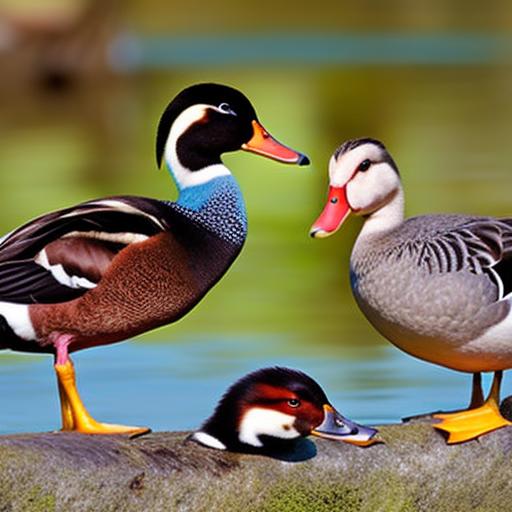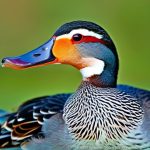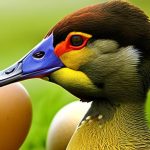Ducks have been kept as pets for centuries, with their origins dating back to ancient Egypt and China. They were initially domesticated for their meat and eggs but have since become popular as pets due to their charming personalities and unique characteristics. Keeping ducks as pets can be a rewarding experience, providing companionship, entertainment, and even practical benefits such as pest control and fertilization.
There are numerous duck breeds to choose from, each with its own distinct characteristics and appearances. Some breeds are better suited for backyard ponds and gardens, while others thrive in larger bodies of water. It’s important to research and understand the specific needs of each breed before deciding which one is right for you.
Key Takeaways
- Duck breeds make great pets and come in a variety of sizes and colors.
- The top 10 duck breeds for keeping as pets include the Pekin, Runner, Khaki Campbell, Muscovy, and more.
- Domestic and wild duck breeds differ in their behavior, habitat, and physical characteristics.
- Pros of keeping ducks as pets include their entertainment value and egg-laying abilities, while cons include their messiness and potential for noise.
- Understanding the behavior and temperament of duck breeds is important for their care and training.
Top 10 Duck Breeds for Keeping as Pets
1. Pekin Ducks: Pekin ducks are one of the most popular duck breeds for pets. They are known for their white feathers, orange bills, and friendly personalities. Pekin ducks are docile and easy to handle, making them great pets for families with children.
2. Indian Runner Ducks: Indian Runner ducks are known for their upright posture and distinctive running gait. They come in a variety of colors and have a curious and active nature. Indian Runner ducks are excellent foragers and can help control pests in your garden.
3. Khaki Campbell Ducks: Khaki Campbell ducks are prized for their egg-laying abilities, with some hens producing up to 300 eggs per year. They have a calm temperament and are easy to care for, making them a popular choice for backyard flocks.
4. Rouen Ducks: Rouen ducks are large, heavy-bodied ducks with beautiful plumage that resembles that of wild Mallards. They are calm and friendly, making them great pets for families. Rouen ducks also make excellent meat birds due to their size.
5. Muscovy Ducks: Muscovy ducks are unique in that they are not true ducks but rather a separate species. They have distinct red facial caruncles and are known for their quiet and gentle nature. Muscovy ducks are excellent foragers and can help control insects and pests.
6. Cayuga Ducks: Cayuga ducks are known for their striking black feathers with an iridescent green sheen. They are calm and friendly, making them great pets for families. Cayuga ducks also have excellent egg-laying abilities.
7. Swedish Ducks: Swedish ducks are medium-sized ducks with blue or black feathers and a white bib. They are known for their friendly and calm temperament, making them great pets for families. Swedish ducks are also good layers of large white eggs.
8. Crested Ducks: Crested ducks, as the name suggests, have a distinctive crest on their heads. They come in various colors and have a friendly and docile nature. Crested ducks make great pets for families and can be easily trained.
9. Call Ducks: Call ducks are small-sized ducks with a distinctive upright posture and a loud quack. They come in various colors and have a friendly and sociable nature. Call ducks make great pets for families and can be easily trained.
10. Welsh Harlequin Ducks: Welsh Harlequin ducks are medium-sized ducks with beautiful plumage that resembles that of wild Mallards. They are known for their calm and friendly temperament, making them great pets for families. Welsh Harlequin ducks also have good egg-laying abilities.
Differences Between Domestic and Wild Duck Breeds
There are significant differences between domestic duck breeds and wild duck breeds, both in terms of physical characteristics and behavior.
Physically, domestic duck breeds tend to have larger bodies, shorter wings, and heavier builds compared to wild duck breeds. Domestic duck breeds have been selectively bred for specific traits such as egg-laying abilities, meat production, or ornamental features. Wild duck breeds, on the other hand, have evolved to survive in their natural habitats and have adaptations that allow them to fly long distances and migrate.
Behaviorally, domestic duck breeds are generally more docile and friendly towards humans compared to wild duck breeds. Domestic ducks have been raised in captivity for generations and have become accustomed to human interaction. Wild duck breeds, on the other hand, are more wary of humans and tend to be more skittish and flighty.
When it comes to choosing a duck breed as a pet, it ultimately depends on your preferences and the specific needs of your household. Domestic duck breeds are generally easier to handle and care for, making them better suited for families with children or those looking for a low-maintenance pet. Wild duck breeds require more space and may not be as suitable for small backyard ponds or urban environments.
Pros and Cons of Keeping Ducks as Pets
Keeping ducks as pets has its advantages and challenges. Here are some of the pros and cons to consider before bringing ducks into your home:
Advantages of having ducks as pets:
1. Companionship: Ducks can be affectionate and form strong bonds with their owners. They enjoy being around people and can provide companionship.
2. Entertainment: Ducks are highly entertaining animals to watch. They have playful personalities and engage in various behaviors such as swimming, diving, and foraging.
3. Pest control: Ducks are natural foragers and can help control pests such as slugs, snails, and insects in your garden or backyard.
4. Fertilization: Duck droppings are rich in nutrients and can be used as organic fertilizer for plants.
5. Egg production: Certain duck breeds, such as Khaki Campbell ducks, are excellent egg layers and can provide a steady supply of fresh eggs.
Challenges of keeping ducks as pets:
1. Mess: Ducks are messy animals and can create a lot of waste. They require regular cleaning of their living area to maintain hygiene.
2. Water requirements: Ducks need access to water for swimming and bathing. This can be a challenge if you don’t have a suitable water source or if you live in an urban environment.
3. Noise: Ducks can be noisy, especially during mating season or when they feel threatened. This can be a concern if you have close neighbors or live in an area with noise restrictions.
4. Predators: Ducks are vulnerable to predators such as raccoons, foxes, and birds of prey. Providing adequate protection and security for your ducks is essential.
5. Commitment: Ducks require daily care and attention, including feeding, cleaning, and monitoring their health. They are long-lived animals and can live up to 10 years or more, so it’s important to be prepared for the long-term commitment.
Despite the challenges, many people find the joys of keeping ducks as pets far outweigh the difficulties. With proper planning and preparation, you can create a suitable environment for your ducks and enjoy the unique experience of having them as part of your family.
Understanding the Behavior and Temperament of Duck Breeds
Ducks are social animals that thrive in the company of others. They form strong bonds with their flock mates and can also develop close relationships with their human caregivers. Understanding the behavior and temperament of duck breeds is essential for building a strong bond with your ducks and ensuring their well-being.
Social behavior of ducks:
Ducks are highly social animals that prefer to live in groups or flocks. They have a hierarchical social structure, with dominant individuals asserting their authority over subordinate members. Ducks communicate through various vocalizations, body language, and displays.
How to bond with your ducks:
Building a bond with your ducks requires time, patience, and consistent interaction. Here are some tips for bonding with your ducks:
1. Spend time with them: Ducks enjoy human company and thrive on social interaction. Spend time with your ducks every day, talking to them, and engaging in activities together.
2. Hand-feeding: Hand-feeding your ducks can help build trust and strengthen the bond between you. Offer treats such as mealworms or chopped vegetables from your hand.
3. Gentle handling: Ducks are sensitive animals and can be easily startled or stressed. Handle them gently and avoid sudden movements or loud noises.
4. Training: Ducks can be trained to respond to basic commands and cues. Use positive reinforcement techniques such as treats and praise to reward desired behaviors.
Common behaviors and what they mean:
Ducks exhibit a range of behaviors that can provide insight into their mood and well-being. Here are some common behaviors and what they may indicate:
1. Tail wagging: Ducks wag their tails when they are excited or happy. It’s a sign of contentment and can often be seen during feeding or swimming.
2. Head bobbing: Ducks bob their heads up and down as a form of communication. It can indicate curiosity, alertness, or a warning to other ducks.
3. Wing flapping: Ducks flap their wings as a way to stretch their muscles and maintain balance. It can also be a display of dominance or courtship behavior.
4. Preening: Ducks spend a significant amount of time preening their feathers to keep them clean and waterproof. It’s a natural behavior that helps maintain their health.
Understanding these behaviors can help you better communicate with your ducks and ensure their needs are met.
Feeding, Housing, and Caring for Your Duck Breeds

Proper feeding, housing, and care are essential for the health and well-being of your duck breeds. Here are some guidelines to follow:
What to feed your ducks:
Ducks have specific dietary requirements that need to be met for optimal health. A balanced diet for ducks should include:
1. Commercial duck feed: High-quality commercial duck feed is formulated to meet the nutritional needs of ducks. Look for feeds specifically designed for ducks and avoid feeds intended for other poultry species.
2. Fresh fruits and vegetables: Ducks enjoy a variety of fresh fruits and vegetables as part of their diet. Offer treats such as lettuce, peas, corn, and berries in moderation.
3. Insects and worms: Ducks are natural foragers and enjoy hunting for insects and worms. Allowing them access to a grassy area or garden can provide additional nutrition and enrichment.
How to provide proper housing:
Ducks require suitable housing that provides protection from the elements, predators, and disease. Here are some considerations for duck housing:
1. Shelter: Ducks need a sheltered area that protects them from rain, wind, and extreme temperatures. A sturdy coop or shed with proper ventilation is ideal.
2. Bedding: Provide a thick layer of straw or wood shavings on the floor of the duck house to absorb moisture and provide insulation.
3. Nesting boxes: Ducks need nesting boxes filled with straw or shavings for egg-laying. Each duck should have its own nesting box to prevent competition.
4. Water source: Ducks need access to clean water for swimming and bathing. A shallow pool or pond is ideal, but if space is limited, a large tub or kiddie pool can suffice.
Daily care routine for ducks:
Ducks require daily care to ensure their health and well-being. Here is a basic care routine for ducks:
1. Feeding: Provide fresh food and water daily, ensuring that the feeders and waterers are clean and free from contamination.
2. Cleaning: Clean the duck house regularly, removing soiled bedding and disinfecting surfaces to prevent the buildup of bacteria or parasites.
3. Grooming: Ducks groom themselves by preening, but they may occasionally need assistance in removing dirt or debris from their feathers.
4. Health checks: Monitor your ducks for any signs of illness or injury. Check their eyes, beaks, feet, and feathers regularly for any abnormalities.
By providing proper nutrition, suitable housing, and regular care, you can ensure the health and well-being of your duck breeds.
Health Concerns and Common Diseases in Duck Breeds
Ducks are generally hardy animals, but they are susceptible to certain health issues and diseases. Being aware of common health concerns and knowing how to prevent and treat them is essential for keeping your ducks healthy.
Common health issues in ducks:
1. Respiratory infections: Ducks can develop respiratory infections due to poor ventilation, damp bedding, or exposure to drafts. Symptoms include coughing, sneezing, nasal discharge, and difficulty breathing.
2. Parasites: Ducks can be affected by external parasites such as mites, lice, and ticks. These parasites can cause irritation, feather loss, and anemia if left untreated.
3. Botulism: Botulism is a bacterial infection that affects ducks that consume contaminated water or food. Symptoms include weakness, paralysis, and difficulty breathing.
4. Egg binding: Female ducks may experience egg binding, a condition where they are unable to lay their eggs. It can be caused by various factors such as stress, nutritional deficiencies, or reproductive abnormalities.
How to prevent and treat these issues:
1. Provide proper housing: Ensure that the duck house is clean, well-ventilated, and free from drafts. Regularly clean bedding and disinfect surfaces to prevent the buildup of bacteria or parasites.
2. Maintain good hygiene: Keep feeders and waterers clean and free from contamination. Provide fresh water daily and remove any stagnant water sources that may attract mosquitoes or other pests.
3. Monitor for signs of illness: Regularly observe your ducks for any signs of illness or abnormal behavior. Seek veterinary care if you notice any symptoms or if you suspect a health issue.
4. Practice biosecurity: Limit contact between your ducks and wild waterfowl to reduce the risk of disease transmission. Quarantine new ducks before introducing them to your existing flock.
When to seek veterinary care:
If you notice any signs of illness or abnormal behavior in your ducks, it’s important to seek veterinary care as soon as possible. A veterinarian with experience in avian medicine can diagnose and treat common duck health issues and provide guidance on preventive care.
Training and Bonding with Your Duck Breeds
Training your ducks can be a fun and rewarding experience that strengthens the bond between you and your feathered friends. Ducks are intelligent animals that can learn basic commands and cues with patience and positive reinforcement.
How to train your ducks:
1. Start with basic commands: Begin by teaching your ducks simple commands such as “come” or “stay.” Use treats as rewards and repeat the commands consistently.
2. Use positive reinforcement: Ducks respond well to positive reinforcement techniques such as treats, praise, and petting. Reward desired behaviors immediately to reinforce the connection between the behavior and the reward.
3. Be patient: Ducks may take some time to understand and respond to commands. Be patient and consistent in your training efforts, and avoid punishment or negative reinforcement.
Tips for bonding with your ducks:
1. Spend quality time together: Ducks enjoy human company and thrive on social interaction. Spend time with your ducks every day to build a strong bond and trust. Engage in activities such as feeding them, talking to them, and even taking them for short walks. This not only provides mental stimulation for the ducks but also allows them to become familiar with your presence and voice. Additionally, interacting with your ducks regularly helps you monitor their health and behavior, ensuring their well-being. Remember, the more time you invest in building a relationship with your ducks, the more rewarding and enjoyable your experience with them will be.
If you’re considering adding duck breeds to your backyard flock, it’s important to provide them with a suitable living space. A well-designed chicken coop can also serve as a comfortable home for ducks. In fact, the article “Where to Put Your Chicken Coop” on Poultry Wizard provides valuable insights on choosing the right location for your coop, ensuring optimal conditions for both chickens and ducks. Additionally, “Chicken Coop Door Size” offers guidance on creating an entrance that accommodates different bird sizes, including ducks. And if you’re interested in the convenience of moving your coop around, “Chicken Coop Portage” explores the benefits and considerations of portable coops. Check out these informative articles to ensure your duck breeds have a safe and comfortable living environment.
FAQs
What are some popular duck breeds kept as pets?
Some popular duck breeds kept as pets include Pekin, Muscovy, Call, and Rouen ducks.
What are the benefits of keeping ducks as pets?
Ducks can be great pets for those who have the space and resources to care for them. They are social animals and can provide companionship, entertainment, and even eggs.
What kind of housing do ducks need?
Ducks need a secure and dry shelter that protects them from predators and the elements. They also need access to water for swimming and cleaning.
What do ducks eat?
Ducks require a balanced diet that includes a mix of grains, vegetables, and protein. Commercial duck feed is available, but they can also eat fruits, vegetables, and insects.
Do ducks require any special care?
Ducks require regular cleaning of their living space and access to fresh water for swimming and cleaning. They also need regular veterinary care and vaccinations to prevent diseases.
Can ducks be trained?
Yes, ducks can be trained to follow basic commands and even perform tricks. Positive reinforcement training methods are recommended.
Are ducks noisy?
Some duck breeds can be noisy, especially during mating season. However, with proper training and socialization, ducks can learn to be quiet and well-behaved pets.
Meet Walter, the feathered-friend fanatic of Florida! Nestled in the sunshine state, Walter struts through life with his feathered companions, clucking his way to happiness. With a coop that’s fancier than a five-star hotel, he’s the Don Juan of the chicken world. When he’s not teaching his hens to do the cha-cha, you’ll find him in a heated debate with his prized rooster, Sir Clucks-a-Lot. Walter’s poultry passion is no yolk; he’s the sunny-side-up guy you never knew you needed in your flock of friends!







